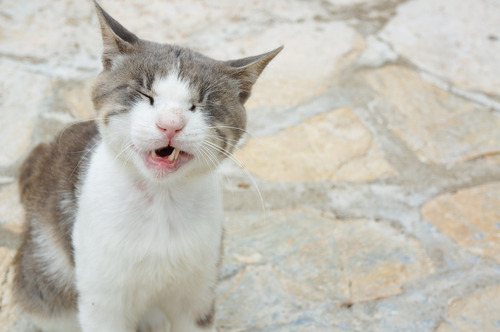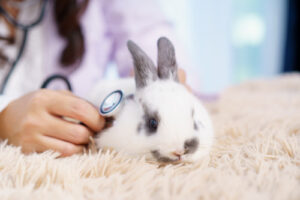If you’ve noticed your cat sneezing frequently, you may be wondering if it’s just a quirky habit or if it signals something more. Occasional sneezing is normal, but when it becomes a regular occurrence, it can leave pet owners concerned. Just like humans, cats sneeze to clear their nasal passages, but frequent sneezing could indicate an underlying health issue that deserves attention. Understanding what causes sneezing and when it’s time to take your cat to the vet can help you make informed decisions about your cat’s well-being. If your cat’s sneezing persists, Cheyenne Mountain Animal Hospital in Colorado Springs, CO, is here to assist. Call (719) 475-1314 or book an appointment online.
What Causes Cats to Sneeze?
Seasonal Allergies and Environmental Irritants
Pollen, dust, and mold are common environmental irritants that may cause your cat to sneeze, especially during peak allergy seasons. Sneezing caused by allergens tends to be mild and might only occur sporadically. Additionally, indoor pollutants like cigarette smoke, scented candles, and air fresheners can irritate your cat’s nasal passages, leading to sneezing. Reducing your cat’s exposure to these irritants and keeping your home as allergen-free as possible can help minimize the frequency of sneezing.
Cleaning and Ventilation Tips
Ensuring proper ventilation and regular cleaning in your home can help reduce allergen levels. Using HEPA air filters and vacuuming frequently with a pet-friendly vacuum can also aid in limiting allergens. Additionally, opting for unscented cleaning products and keeping windows closed during high-pollen seasons can support a more comfortable environment for your cat.
Upper Respiratory Infections in Cats
These infections, which often result from viral or bacterial infections, can cause frequent sneezing particularly in kittens and cats in multi-cat households or shelters. The feline herpesvirus and calicivirus are leading viral causes, while bacterial infections, like Bordetella and Mycoplasma, can contribute to sneezing as well. Cats with URIs may also display other symptoms such as runny eyes, nasal discharge, and a decrease in appetite.
Dental Issues and Their Impact on Sneezing
Dental health and respiratory health are more connected than you might think. Dental diseases can lead to sinus infections and other respiratory complications. When a cat has an advanced dental condition, bacteria from the mouth may enter the nasal passages, causing inflammation and sneezing. Symptoms such as bad breath, pawing at the mouth, and difficulty eating could suggest that a dental issue might be causing your cat’s sneezing.
Addressing Dental Health Concerns
Regular dental check-ups for your cat are necessary to prevent issues that could impact their respiratory system. Dental cleanings and monitoring of oral health can go a long way in minimizing the risk of sneezing due to infections stemming from poor oral hygiene.
Foreign Objects and Nasal Blockages
Cats are curious creatures, and sometimes, foreign objects like blades of grass, small twigs, or even fur can get lodged in their nasal passages. When a foreign object obstructs the nasal passage, it can lead to repetitive sneezing as the cat attempts to dislodge the irritant. Persistent sneezing, especially if it’s sudden and intense, may indicate that something is stuck in your cat’s nose.
When Do Nasal Blockages Require Professional Care?
If you believe your cat’s sneezing is caused by a foreign object, avoid trying to remove it yourself. Veterinary professionals are equipped with the tools and expertise to handle such situations safely. Contact Cheyenne Mountain Animal Hospital to assess and address any blockages in a controlled environment.
Cat Sneezing and Stress-Related Factors
Cats under stress or anxiety, perhaps due to a recent move, the arrival of a new pet, or a change in routine, might exhibit sneezing as part of a stress response. This type of sneezing is typically mild and may subside as the cat adjusts to its environment.
Supporting Your Cat During Stressful Times
Creating a calm, stable environment for your cat can help reduce stress-induced sneezing. Offering safe spaces, establishing regular routines, and using stress-relief products, such as feline pheromone diffusers, can be beneficial. Monitoring your cat’s behavior and addressing potential stressors can make a difference in your cat’s respiratory comfort.
Possible Allergic Reactions to Food or Medications
If you have recently changed your cat’s diet or started a new medication, this could be a factor in their sneezing. In cases of a food or medication allergy, other symptoms like itching, vomiting, or skin rashes may accompany the sneezing.
Identifying and Avoiding Allergens
If you suspect a food or medication allergy, work with your veterinarian to identify potential allergens and determine the best course of action. A careful review of your cat’s diet and medications can help pinpoint any items that might be contributing to their sneezing, allowing for an alternative approach if needed.
Persistent Cat Sneezing and Potential Health Concerns
If your cat’s sneezing has become frequent or is accompanied by other signs such as lethargy, a runny nose, or a decrease in appetite, it could indicate a more serious health issue. Chronic sneezing could be related to conditions such as nasal polyps, tumors, or more advanced respiratory conditions that require medical intervention. These cases warrant a thorough examination from a veterinary professional who can diagnose and recommend the appropriate treatment.
When Should You Take a Sneezing Cat to the Vet?
While occasional sneezing is normal for cats, frequent or severe sneezing calls for veterinary attention. Understanding the common causes can help you recognize when to seek professional guidance for your cat’s health. Cheyenne Mountain Animal Hospital in Colorado Springs is here to support you in determining the best care options for your sneezing cat. Call (719) 475-1314 or book an appointment online to ensure your cat gets the attention they need for a comfortable, sneeze-free life.





